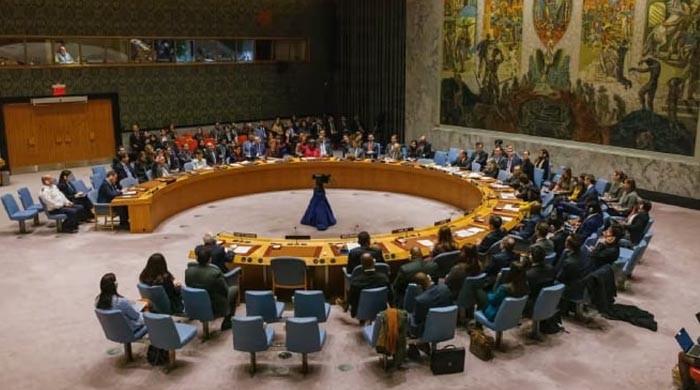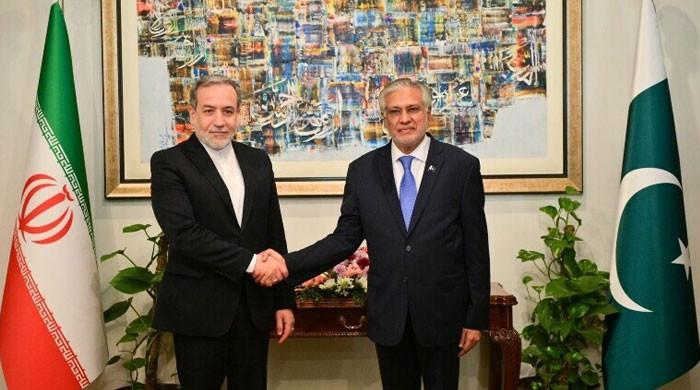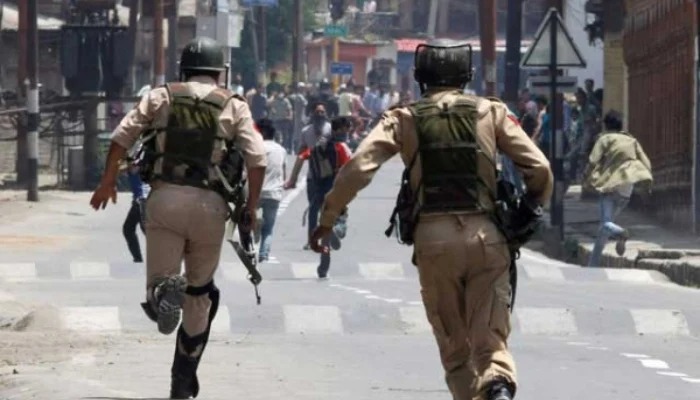ISLAMABAD (Big Digit) India-Pakistan tension; International community mobilized, Pakistan decides to brief the Security Council
(Asghar Ali Mubarak)
ISLAMABAD (Big Digit) The international community is mobilized on the Indo-Pak tensions, while Pakistan has officially decided to brief the UN Security Council on the latest situation in the region. India’s move after the Pahalgam incident has failed to gain global support. Meanwhile, President Asif Ali Zardari has summoned a session of the National Assembly at 5 pm today at the Parliament House under Article 54, Clause 1.
 The meeting will discuss the situation of Pak-India tension after the Pahalgam false flag operation. On the other hand, Iranian Foreign Minister Abbas Araqchi is expected to arrive in Pakistan today amid the Pak-India tension. After Pakistan, Abbas Araqchi is also likely to go to India. Russia has advised India to hold talks with Pakistan. Russian Foreign Minister Sergei Lavrov made a telephonic contact with his Indian counterpart Subrahmanyam Jaishankar. The two leaders discussed the tense situation between Pakistan and India after the Pahalgam incident. The Russian Foreign Minister He sent a message to India that it should take steps to resolve the dispute with Pakistan on a diplomatic level instead of war. It may be recalled that earlier, China and Turkey have also reiterated Pakistan’s position to reduce the tense situation in the region. European Union Foreign Affairs Chief Kaja Claus, the foreign ministers of Switzerland and Greece have also stressed the importance of dialogue between the two countries to reduce tensions. US Congressman Keith Self had made it clear that he could not even think of a war between Pakistan and India, both neighboring countries are nuclear powers, and if a war breaks out, they will not be under anyone’s control. He expressed hope that Pakistan and India would reduce tensions. Earlier, Greece, which assumed the presidency of the UN Security Council, had said that a meeting of the UN Security Council could be called on the growing tension between India and Pakistan. Greek Ambassador Angelos Sekiris briefed UN journalists about the work program of the Security Council during Greece’s month-long presidency. Angelos Sekiris said that the Security Council meeting on the Pak-India tension may be held soon or some time later, Foreign Minister Ishaq Dar has directed Pakistan’s Permanent Representative to the United Nations to take steps to convene a meeting of the UN Security Council, the Foreign Office spokesperson said in a statement issued on Tuesday that Pakistan will inform the UN Security Council about India’s aggressive actions and provocations. India’s aggressive actions are endangering peace and security in South Asia and beyond the region. According to the Foreign Office spokesperson, this important diplomatic move is part of Pakistan’s efforts to present the correct facts to the international community. Pakistan will highlight India’s illegal actions to suspend the Indus Waters Treaty.
The meeting will discuss the situation of Pak-India tension after the Pahalgam false flag operation. On the other hand, Iranian Foreign Minister Abbas Araqchi is expected to arrive in Pakistan today amid the Pak-India tension. After Pakistan, Abbas Araqchi is also likely to go to India. Russia has advised India to hold talks with Pakistan. Russian Foreign Minister Sergei Lavrov made a telephonic contact with his Indian counterpart Subrahmanyam Jaishankar. The two leaders discussed the tense situation between Pakistan and India after the Pahalgam incident. The Russian Foreign Minister He sent a message to India that it should take steps to resolve the dispute with Pakistan on a diplomatic level instead of war. It may be recalled that earlier, China and Turkey have also reiterated Pakistan’s position to reduce the tense situation in the region. European Union Foreign Affairs Chief Kaja Claus, the foreign ministers of Switzerland and Greece have also stressed the importance of dialogue between the two countries to reduce tensions. US Congressman Keith Self had made it clear that he could not even think of a war between Pakistan and India, both neighboring countries are nuclear powers, and if a war breaks out, they will not be under anyone’s control. He expressed hope that Pakistan and India would reduce tensions. Earlier, Greece, which assumed the presidency of the UN Security Council, had said that a meeting of the UN Security Council could be called on the growing tension between India and Pakistan. Greek Ambassador Angelos Sekiris briefed UN journalists about the work program of the Security Council during Greece’s month-long presidency. Angelos Sekiris said that the Security Council meeting on the Pak-India tension may be held soon or some time later, Foreign Minister Ishaq Dar has directed Pakistan’s Permanent Representative to the United Nations to take steps to convene a meeting of the UN Security Council, the Foreign Office spokesperson said in a statement issued on Tuesday that Pakistan will inform the UN Security Council about India’s aggressive actions and provocations. India’s aggressive actions are endangering peace and security in South Asia and beyond the region. According to the Foreign Office spokesperson, this important diplomatic move is part of Pakistan’s efforts to present the correct facts to the international community. Pakistan will highlight India’s illegal actions to suspend the Indus Waters Treaty.

It should be noted that India had announced the suspension of the Indus Waters Treaty on April 23 after the death of 26 tourists in the Muslim-majority region of Pahalgam in occupied Kashmir on April 22. In response, the National Security Committee meeting decided to close trade with India and the Wagah border.
In addition, Pakistani airspace was also closed for Indian airlines, and Indian citizens were ordered to leave Pakistan within 48 hours.
The United Nations has urged India and Pakistan to show maximum restraint after the attack in occupied Jammu and Kashmir.
UN Secretary-General’s spokesman Stephane Dujarric urged both governments to exercise maximum restraint and ensure that the situation and the progress we have seen do not deteriorate further. China, Pakistan’s long-standing friend, has also appealed to both countries to exercise restraint. Chinese Foreign Ministry spokesman Guo Jiaqin said in a press briefing that “China hopes that both sides will exercise restraint, properly resolve relevant differences through dialogue and consultation, reach a consensus, and jointly maintain regional peace and stability.” On the other hand, the Gulf Cooperation Council has advised Pakistan and India to de-escalate tensions and resume talks, while urging the international community to intensify efforts to find a peaceful solution to the issue of occupied Jammu and Kashmir. Gulf Cooperation Council Secretary-General Jassim Al-Badawi has expressed the Council’s deep concern over the deteriorating security situation in South Asia. They have called for restraint and the immediate resumption of talks between Pakistan and India. The Secretary-General of the Gulf Cooperation Council also urged the international community to intensify its efforts to find a peaceful solution to the Jammu and Kashmir issue in accordance with the relevant UN Security Council resolutions.
Meanwhile, Saudi Arabia’s Ambassador to Pakistan Nawaf bin Saeed Al-Maliki, UAE Ambassador Obaid Ibrahim Salem Al-Zabi and Kuwait’s Ambassador met Prime Minister Shehbaz Sharif separately. The ambassadors of these countries expressed their desire to work with Pakistan for peace and security in the region.
Saudi Arabia’s Ambassador to Pakistan Nawaf bin Saeed Al-Maliki met Prime Minister Shehbaz Sharif. The Prime Minister said that Saudi Arabia has always expressed solidarity with Pakistan, saying that Pakistan has condemned all forms and manifestations of terrorism.
The Prime Minister reiterated his demand for a transparent and impartial international investigation into the incident. The Prime Minister urged brotherly countries, including Saudi Arabia, to put pressure on India to reduce tensions in the region. The Saudi ambassador said that Saudi Arabia wants to work with Pakistan for peace and security in the region. Meanwhile, UAE Ambassador Hamad Obaid Ibrahim Salem Al Zaabi also called on Prime Minister Shehbaz Sharif at the Prime Minister’s House. The Prime Minister thanked the UAE for its unwavering support for Pakistan. The meeting also discussed the situation in the region after the Pahalgam incident. The ambassador expressed his determination to work with Pakistan for regional peace and security. Meanwhile, the Kuwaiti ambassador met Prime Minister Muhammad Shehbaz Sharif, in which detailed discussions were held regarding the Pahalgam incident. On this occasion, Shahbaz Sharif said that the two countries have always stood by each other. Shahbaz Sharif said that Pakistan condemns terrorist incidents in the region, India linked the Pahalgam incident to Pakistan without evidence. He said that Pakistan has offered the international community a transparent investigation into the incident. During the conversation between Prime Minister Shahbaz Sharif and Malaysian Prime Minister Anwar Ibrahim, India’s provocative behavior after the Pahalgam incident was discussed. On this occasion, Shahbaz Sharif, while talking about the incident in the tourist destination of Pahalgam in occupied Kashmir, said that Pakistan condemns terrorist incidents in the region and Pakistan does not want to get involved in such conflicts. It should be noted that immediately after the attack on tourists in the tourist valley of Pahalgam near occupied Kashmir on April 22, India had blamed Pakistan for the attack. India’s aggressive approach after the Pahalgam incident has suffered another diplomatic setback.
The international community showed strategic hesitation in this regard, which India had expected. Allegedly attributing the attack to cross-border terrorism, India adopted a confrontational stance towards Pakistan. But India’s response was not sudden, but it was part of a larger strategy that has been developing for the past decade. The Bharatiya Janata Party (BJP) government led by Narendra Modi, which not only sees matters through the lens of Hindu nationalist ideology, but is also pursuing another larger strategy, which is to change India’s role in the South Asian region and make it a powerful country in the region that has no rivals.
New Delhi saw the Pahalgam incident as an opportunity to strengthen this stance. India built this approach on the assumption that the global environment was favorable to it.

India’s growing ties with the United States, its central role in the Quad alliance, and its position against China convinced policymakers in New Delhi that strategic partners would offer unconditional support.
Pakistan, on the other hand, was seen as a weak state suffering from economic crisis while overly dependent on China. Thus, the escalation after the Pahalgam incident was a deliberate move to capitalize on India’s growing capabilities and redefine relations with Pakistan. However, India was disappointed to see that it failed to garner the expected global support that would legitimize its aggressive behavior. The United States preferred strategic stability and long-term partnership rather than taking sides,
China maintained its alliance with Pakistan and maintained neutrality on the issue, while the Gulf countries also acted cautiously on the issue.
US Vice President JD Vance was on a visit to India at the time of the Pahalgam attack, which reinforced the belief that Washington would implicitly support India. But those expectations were dashed when President Donald Trump did not take the issue seriously. US Vice President JD Vance has said that Washington hopes that India’s response to the recent attack in occupied Kashmir will not lead to a wider regional conflict.
As the global media questioned why India had not presented clear evidence against Pakistan, this increased suspicion, making it difficult for India to garner international support, unlike the 2019 Pulwama attack. Gulf countries, traditionally considered friends of India due to their strong trade ties with India and large Indian nationals living in their countries, also played a neutral role. Saudi Arabia, the United Arab Emirates and Qatar have issued statements calling for a de-escalation and peaceful resolution of the issue. These responses were less about backing the Indian position and more about protecting their strategic interests. The response was less about supporting the Indian position and more about protecting its own strategic interests. Saudi Arabia, which is invested in regional stability, wants to avoid choosing between India and Pakistan. India’s closest economic partner, the United Arab Emirates, has a large Pakistani workforce and also values diplomatic balance. Qatar, known for its mediation diplomacy, has maintained a neutral stance in line with its broad foreign policy.







